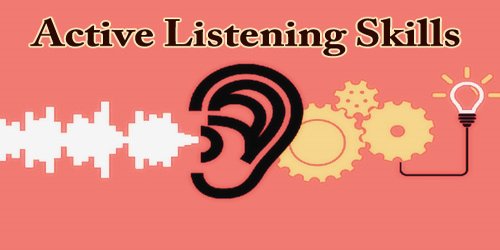Active listening could be a helpful skill for any worker to develop. It helps us truly understand what people are saying in conversations and meetings. Developing this soft skill will help us build and maintain relationships, solve problems, improve processes, and retain information like instructions, procedures, and expectations.
Active listening requires that the listener fully concentrate, understand, respond, so remember what’s being said. This can be opposition to other listening techniques like reflective listening and empathic listening. It’s a soft skill that’s held in high regard by employers. When interviewing for jobs, using active listening techniques can help show the interviewer how our interpersonal skills can draw people out.
Communication skills are beneficial in and out of the workplace. Having the power to obviously communicate instructions, ideas and ideas can help us find success in any career. With practice, anyone can develop their communication skills. Active listening redirects our focus from what’s occurring inside our head to the requirements of our prospective employer or interviewer. This system can help reduce our nervousness during an interview. Listening skills may establish flow instead of closed-mindedness. Negative emotions include stress, anger, and frustration.
There are plenty of active listening techniques that will improve the impression we can make at a job interview. Active listening techniques include:
- Building trust and establishing rapport
- Demonstrating concern
- Paraphrasing to show understanding
- Using nonverbal cues which show understanding such as nodding, eye contact, and leaning forward
- Brief verbal affirmations like “I see,” “I know,” “Sure,” “Thank you,” or “I understand”
- Asking open-ended questions
- Asking specific questions to seek clarification
- Waiting to disclose your opinion
- Disclosing similar experiences to show understanding
Whether we are seeking a brand new job opportunity, striving to earn a promotion or working to enhance in our current role, improving our active listening skills will help us succeed. Very similar to critical thinking and conflict resolution, this soft skill will help increase our price as an employee. Here are several benefits of being an active listener:
It helps us build connections. Active listening helps others feel comfortable sharing information with us. Once we demonstrate our ability to sincerely hear what others should say, people are going to be more fascinated by communicating with us on an everyday basis. This may help open up opportunities to collaborate with others, get work done quickly, or start new projects. All of those things can help lead us to success in our careers.
It helps us to make trust. When people know they will speak freely to us without interruptions, judgment, or unwelcome interjections, they’ll be more likely to speak in confidence to us. This can be especially helpful when meeting a brand new customer or business contact with whom we wish to develop a long-term working relationship.
It helps us identify and solve problems. Actively paying attention to others will help us detect challenges and difficulties others face, or problems within projects. The more quickly we are able to spot these issues, we sooner we will find an answer or create a thought to handle it.
It helps us increase our knowledge and understanding of varied topics. Great employees are always striving to find out something new and grow their knowledge domain. Because active listening helps us retain information, it’ll also help us better understand new topics and remember what we’ve learned so we will apply it within the future.
It helps us avoid missing critical information. Because active listeners are highly engaged with the speaker, they’re able to recall specific details. This is often especially important when the speaker is proving instructions, training us on a replacement processor delivering a message we are chargeable for passing along to others.
Active listening involves the listener observing the speaker’s behavior and visual communication. Having the flexibility to interpret a human visual communication lets the listener develop a more accurate understanding of the speaker’s message. Having heard, the listener may then paraphrase the speaker’s words. It’s important to notice that the listener isn’t necessarily considering the speaker simply stating what was said.
Never underestimate the ability of sentimental skills (also called people skills) like active listening. Our CV or resume may look great, with a robust array of professional experience and training, but employers also are searching for people that have the power to speak and to team well with others.
In the book Leader Effectiveness Training, Thomas Gordon, who coined the term “active listening”, states “Active listening is certainly not complex. Listeners need only restate, in their own language, their impression of the expression of the sender. Still, learning to do Active Listening well is a rather difficult task …”
Information Sources:
- indeed.com
- thebalancecareers.com
- wikipedia
















